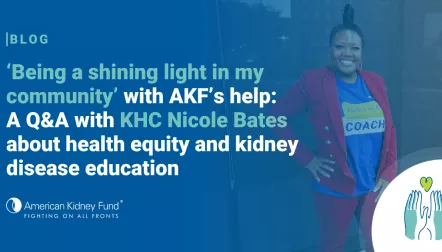CKD awareness and prevention
Building awareness and emphasizing the importance of testing in at-risk communities
Your identity should never determine your kidney health. Learn more about our nationwide effort to close gaps in care through education and policy change. We don't just believe in kidney health for all, we work for it.
Kidney health care should be within everyone's reach. However, systemic biases and social barriers put Black and Hispanic communities at greater risk. These communities are more likely to develop kidney failure, also called end-stage renal disease (ESRD) or end-stage kidney disease (ESKD), and less likely to receive a transplant. Kidney Health for All (KHFA) is the American Kidney Fund’s (AKF) pledge to tear down these obstacles through education, advocacy, prevention programs, and community collaboration.
Talking to your doctor is an important part of managing your health, but for some it’s not always easy. Hear from the American Kidney Fund’s, Chief Medical Officer, Dr. Pranav Garimella, as he addresses some common questions and concerns around having important conversations with your doctor.
Kidney disease is the fastest growing non-contagious disease in the United States. 1 in 7 American adults are living with kidney disease. People of all races and backgrounds can get kidney disease, but Black and Hispanic/Latino people are more likely to have kidney failure.
Compared to white people, Black people are 4 times as likely to develop kidney failure and Hispanic people are twice as likely.
Black and Hispanic people are more likely to have diabetes and high blood pressure, the two top causes of kidney disease.
Black and Hispanic Americans are less likely to be referred to a nephrologist (kidney doctor) until the later stages of kidney disease.
Black and Hispanic people are less likely to participate in home dialysis, less likely to enroll in clinical trials and less likely to receive a kidney from a living donor.
Understanding kidney disease means looking at both medical and social factors that impact certain groups more than others.
Some causes of kidney disease are genetic, but studies have shown that social determinants of health (life conditions), structural racism (unfair rules due to skin color) and implicit bias (unseen judgement) can result in Black and Hispanic people:
At the heart of Kidney Health for All are four areas of focus that guide our work. Each area addresses a major challenge that prevents people from getting the kidney care they need.

Building awareness and emphasizing the importance of testing in at-risk communities
Recruiting a more diverse group of participants to reflect the populations the medicines will treat
Increasing understanding and adoption of home dialysis
Removing barriers to transplant, so everyone has equal access to a lifesaving transplant

Everyone deserves their best kidney health
People and organizations across the community are working together to improve health equity. To advance these efforts, AKF has assembled a diverse group of community organizations, professional associations, health professionals, patients and advocates to form AKF’s Health Equity Coalition. This group works with us to develop evidence-based solutions to tackle health disparities and advance health equity in kidney disease. We are grateful to our AKF Health Equity Coalition members.
Join AKF's movement for kidney health equity. Learn how to become a Kidney Health Coach, apply for grants, partner with us, train as an advocate, or share your story to help prevent kidney disease and support communities.

Resources
Learn about preventing and managing kidney disease.

The CARE Act is so important because it is going to ensure that there are studies that will take a look at why kidney disease is so prominent when it comes to rural communities and underserved, underrepresented racial backgrounds.
Working together
We are grateful to the corporations that are providing the funding support to make a difference in our health equity work.
Presenting Sponsors
Equity Sponsors



